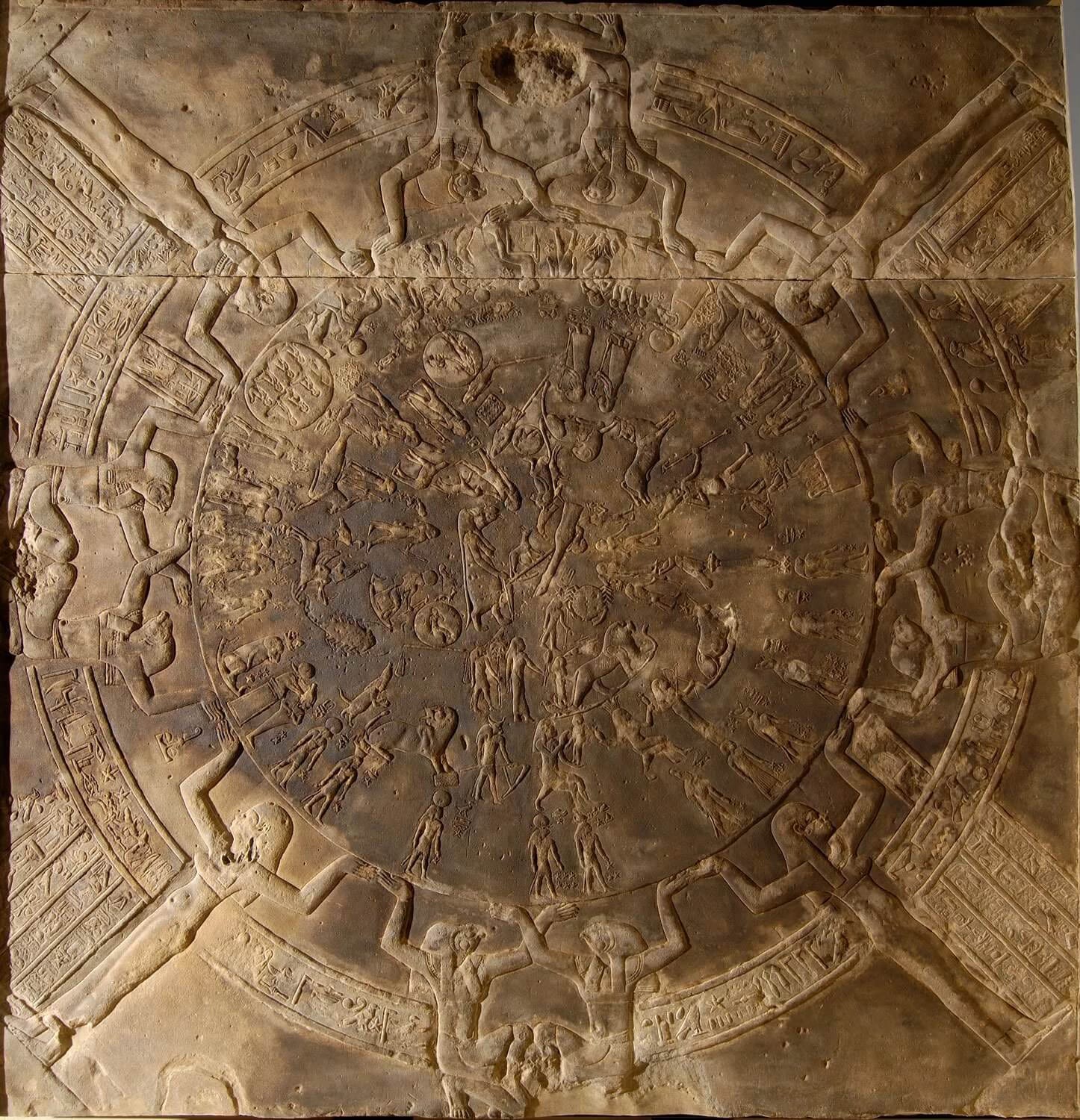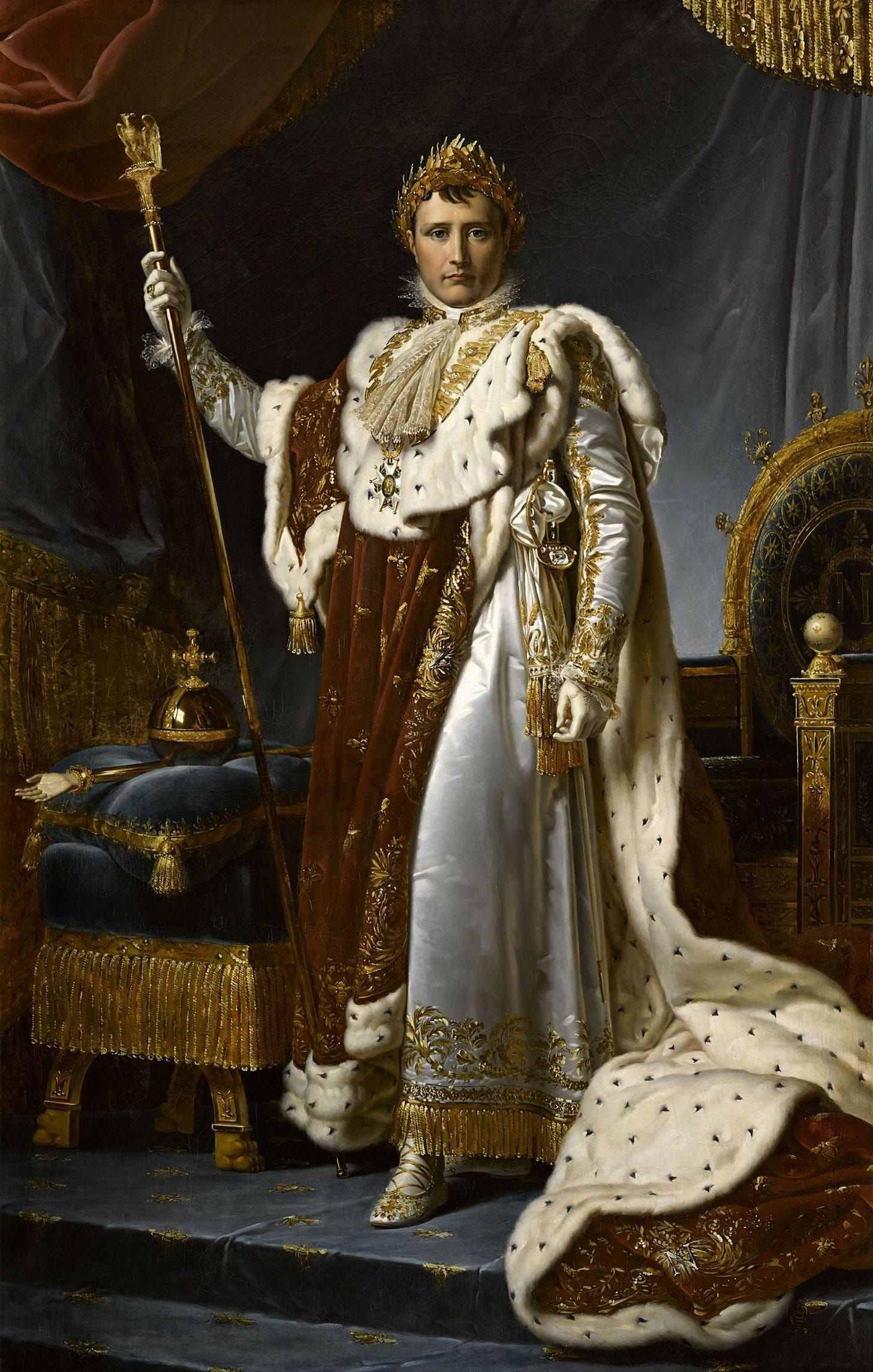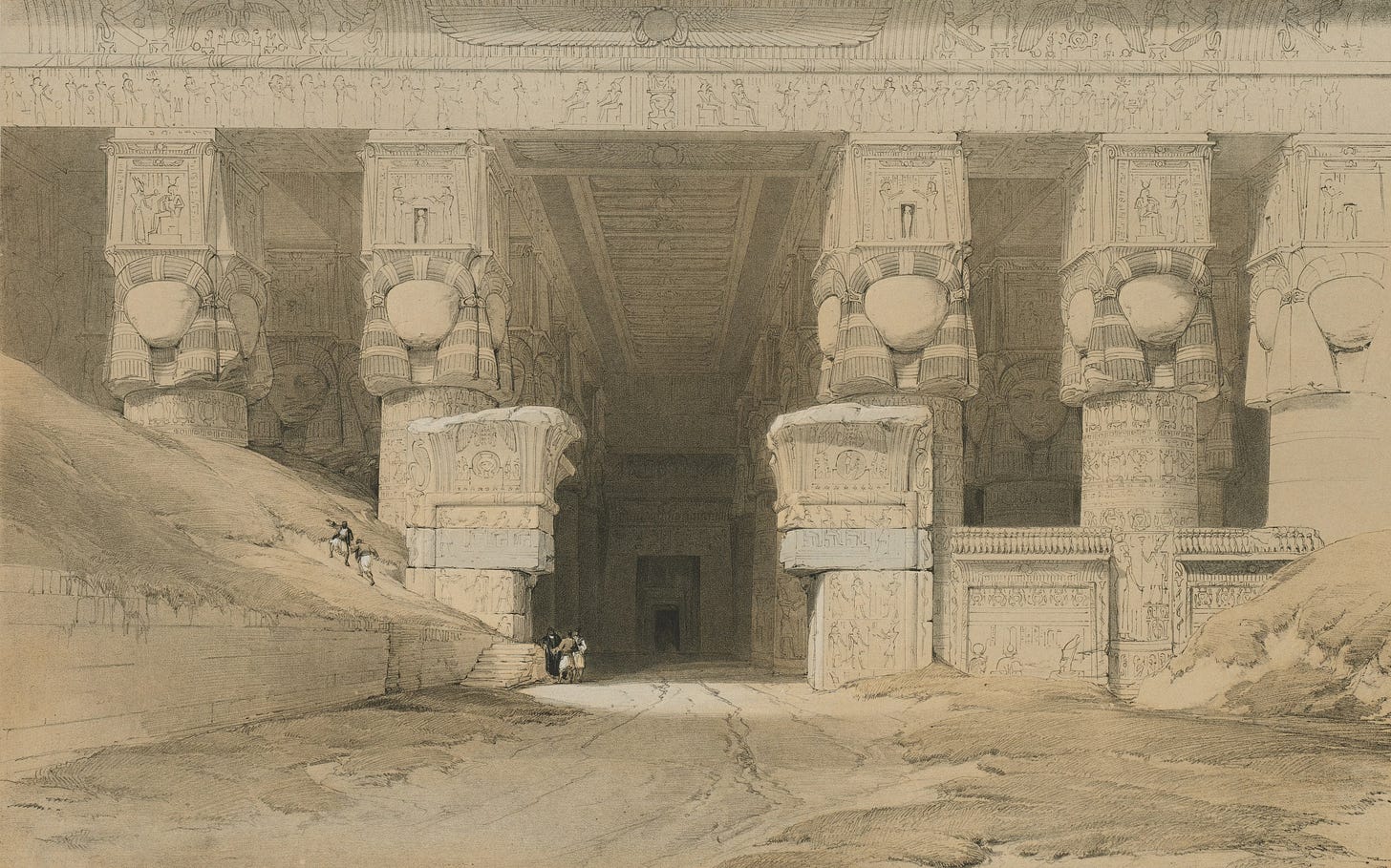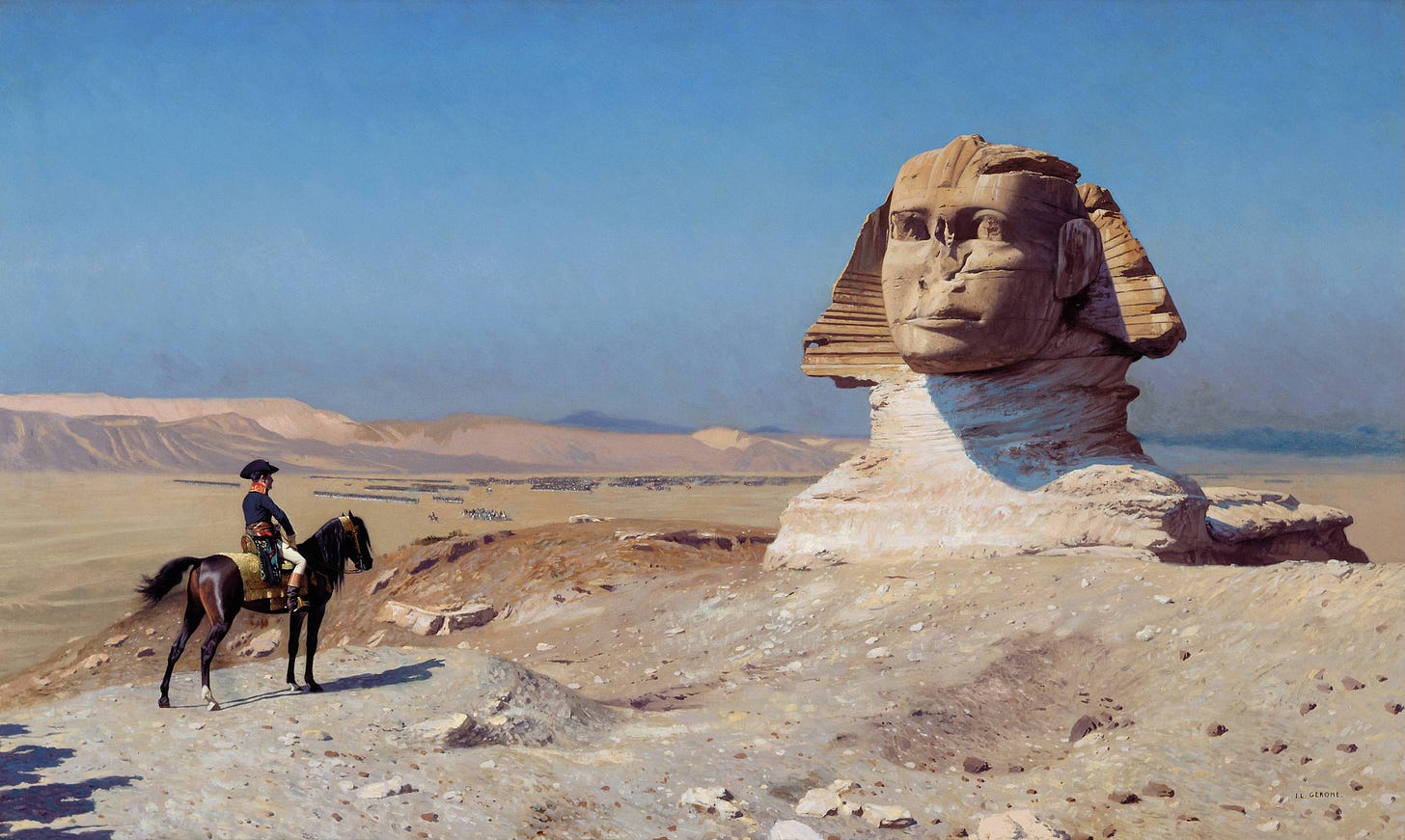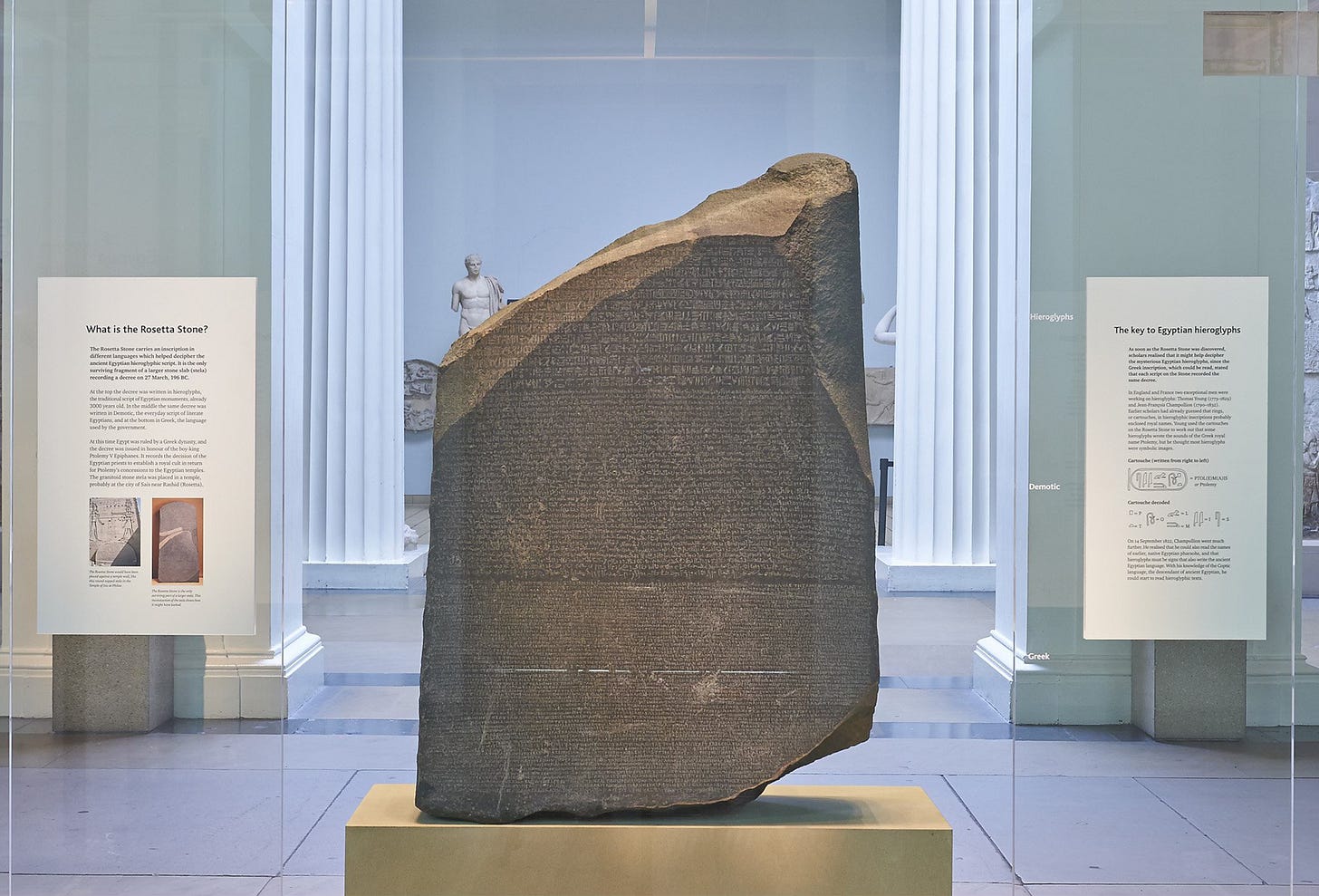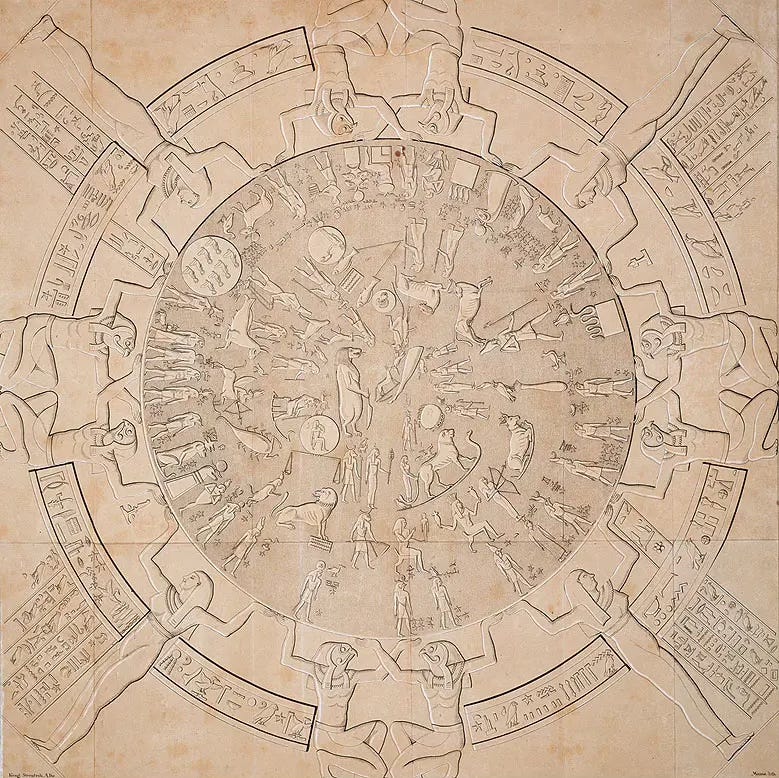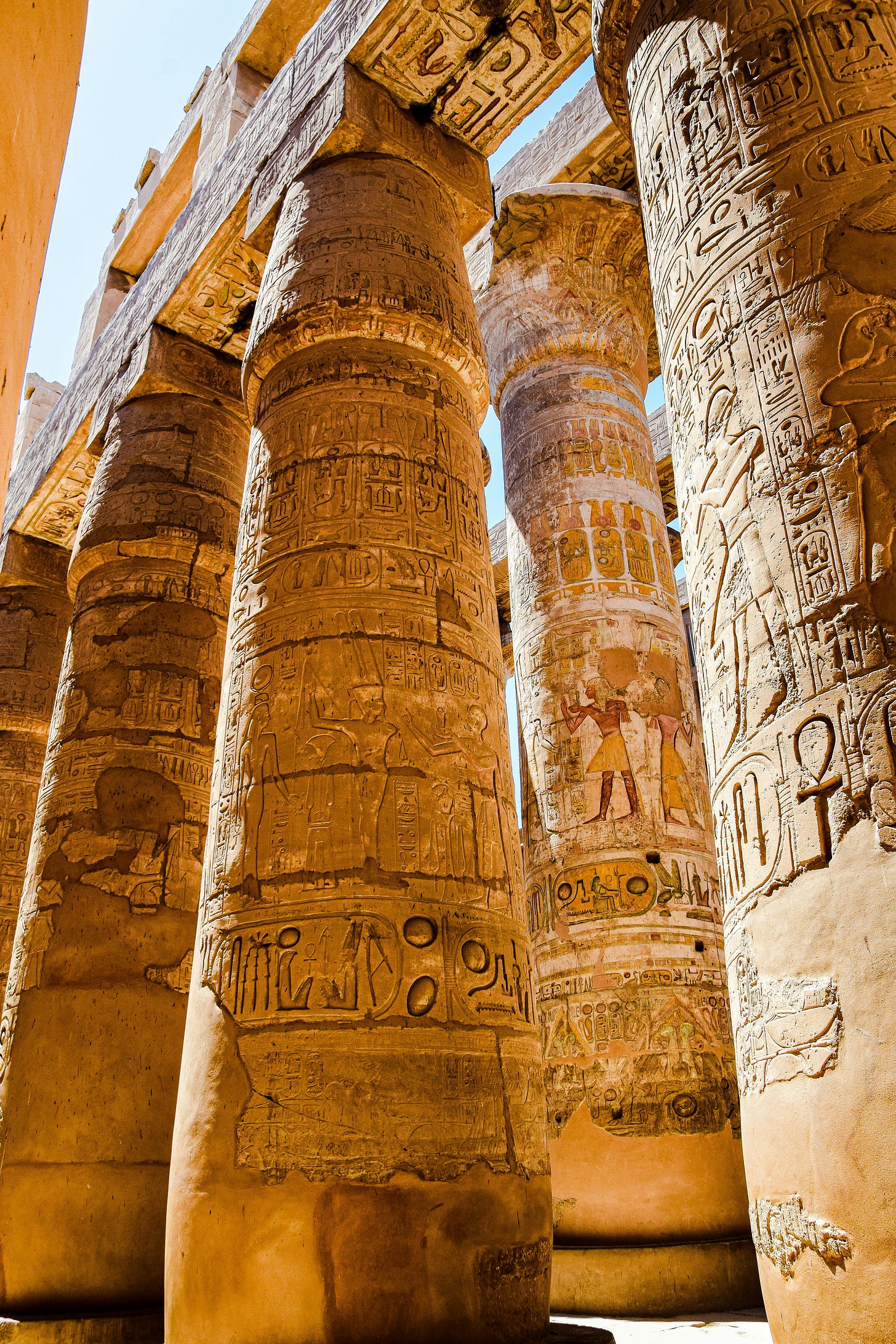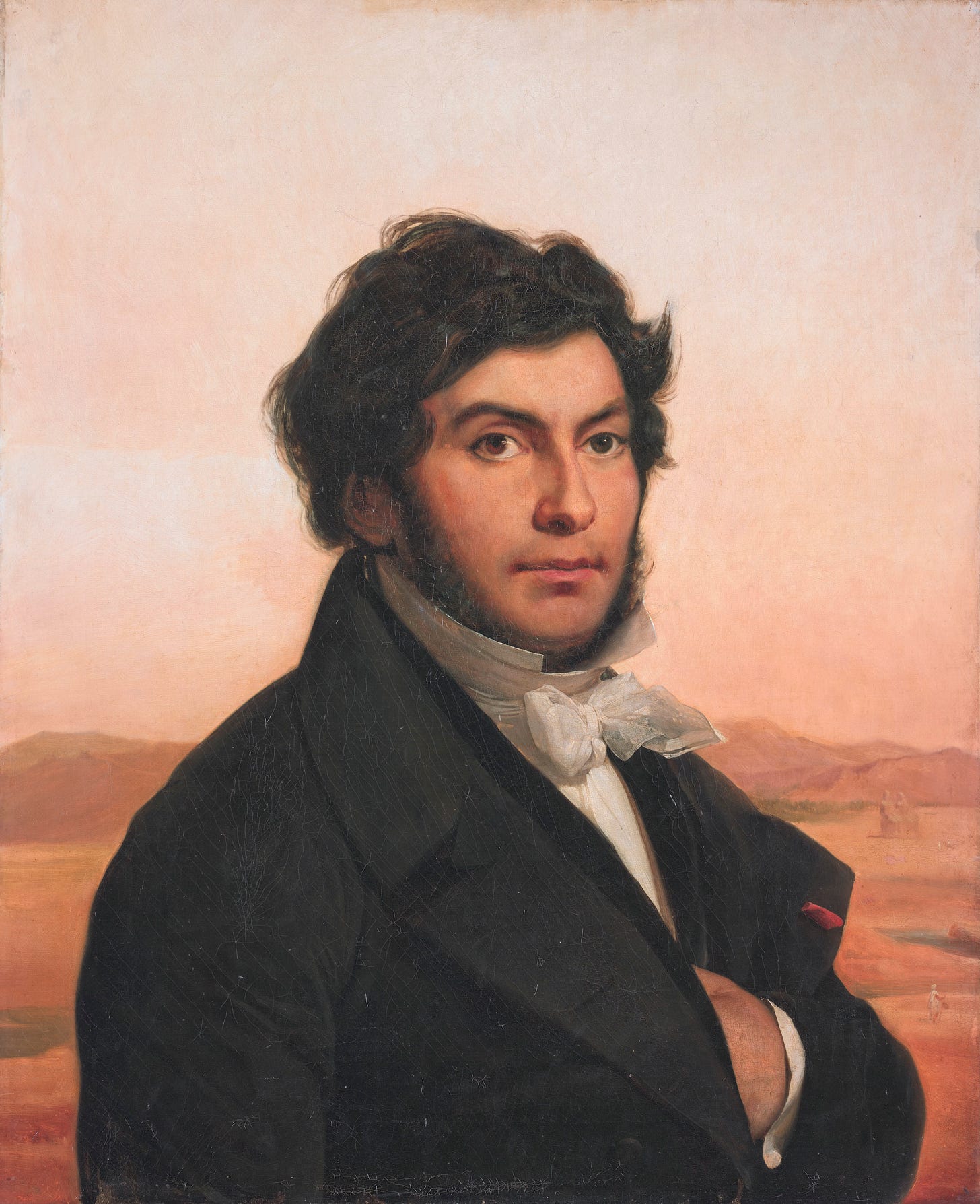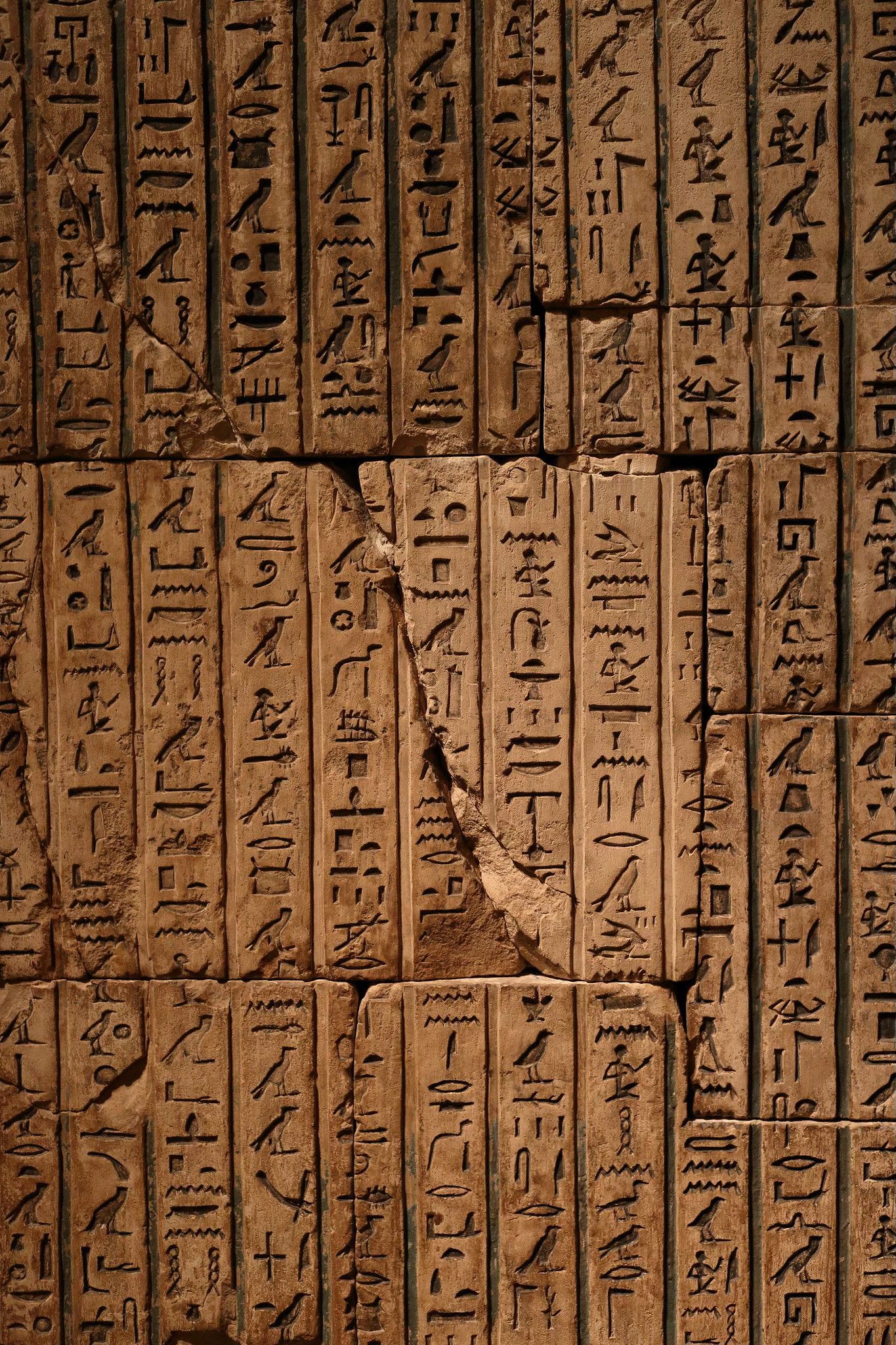In the early 1800s, the Zodiac of Dendera, aka the Zodiac of Paris, was a popular topic of conversation. The buzz infiltrated dinner parties and newspapers, and was at the center of heated scholarly debates. What was so significant about this artifact and why is it not given as much airtime 200 years after its discovery?1
The historical context is essential to understanding the hype of the zodiac. The French Revolution had encouraged hatred towards Christianity and attempted to overturn the nation’s religious culture. This restructure transpired at many levels, as churches were turned into temples dedicated to human reason, statues of Mary and baby Jesus were reimagined to be seen as Isis and Horus, and deconstruction of the Bible continued as a favorite pastime.
However, as Napoleon began to stabilize France (yes, he did fight in wars, but he also worked to bring order back to the nation after years of corrupt and chaotic governance), Christianity was seen as a major asset to restoring order. Surprisingly, there was a religious renewal in France. Of course, not everyone saw the resurgence of Christian influence as positive progress. ‘Enlightened’ atheists revered philosophers, such as Voltaire, who had worked so hard to attack every aspect of Christianity, desiring to remove the chains that Christianity imposed on society. The atheistic scholars of this era sought to diminish the Bible’s authority, which would then undermine the influence of the Roman Catholic Church. Enter the Zodiac of Dendera. This artifact was discovered inside an Egyptian temple and would serve to bolster hostility against the reliability of Scripture.
The early 1800s was the beginning of Egyptomania, when Europeans were amazed and obsessed with anything related to Ancient Egypt. Travel journals, scholarly articles, and anything really, that focused on Egypt became a best-seller. However, information about Egypt was known, not from the ancient Egyptians themselves, but only from the statements of outsiders (such as the Bible, Greek historians, and a few other texts). Ancient Egyptian languages had been unknown since c. AD 400, and thus this ancient culture carried mystery and intrigue.
The expedition that sparked Egyptomania was Napoleon’s invasion of Egypt. Napoleon stated, “To destroy England thoroughly, the time is coming when we must seize Egypt.”
In 1799, as the French reinforced the defenses of Fort Julien, they uncovered one of the most significant archaeological discoveries of all time: the Rosetta Stone.
The historical analysis needs to conclude, so suffice it to say, the Rosetta Stone was confiscated by the British.2 The French had lost their prized possession, but there was another option. In 1802, French scholars in Egypt made drawings and engravings of the Dendera zodiac and published their copies in France. In 1820, the zodiac was cut and (literally) blown out of the temple’s ceiling, and then smuggled to Paris. For 20 years, from 1802 to 1822, religious and non-religious scholars argued and debated over the origin of the zodiac.
Egypt was considered to be one of the oldest civilizations in history, but how old was it? No one could read Egyptian scripts to unveil the mystery, but some academics saw the Zodiac of Dendera as the answer. Scholars thought they could shed light on the subject by analyzing the zodiac’s constellations and their positions. The astronomers thought this investigation would reveal when the zodiac was created, which would provide them with an approximate date for Egyptian origins. (Meaning, if astronomers could determine a fixed date for when the zodiac was created, then Egyptian civilization would obviously be much older than that specific date, because science, engineering, and the culture itself would need years to develop).
In this era, Christians widely accepted that the earth was created around 4000 BC and that Noah’s Flood took place around 2500 BC (Due to the genealogies found in Genesis). Therefore, according to Christians, Egyptian culture must have dawned after 2500 BC.
Finally, we arrive at the zodiac’s short-term significance. Atheistic scholars began to assert that the zodiac was created anywhere from 15000 BC to c. 2500 BC. (We will not mention the mass number of names, nor the greater number of arguments and counterarguments). If the Zodiac was created within that timeframe, then it would predate Creation or be too close to the Flood for civilization to develop. Both situations would bring the Bible’s reliability into question. This breaking of the Bible’s influence is what the non-religious had hoped for, as the Christian resurgence was making its way back into France. At the risk of oversimplification, for two decades debate raged over the zodiac and Biblical chronology. The zodiac’s origin varied, depending on the astronomer, but atheists agreed that the zodiac disproved Genesis. If Genesis falls, so too does the rest of Scripture.
Recall, that Christianity was deemed as a stabilizing force, so it was not always wise for atheists to vehemently attack Scripture. Napoleon even publicly chastised one esteemed astronomer (Lelande) for his (Leland’s) atheistic interpretations of the zodiac and what those interpretations may produce in the culture. Understanding the threat, the scholar changed his findings to include an alternate dating which was more agreeable with Biblical chronology.
Of course, if scholars could have read Egyptian languages, specifically hieroglyphs, the problem would have been solved sooner. While French astronomers studied the Dendera zodiac, various other scholars analyzed the Rosetta Stone. One scholar, Jean-Francois Champollion, will forever be linked to the Rosetta Stone and the unraveling of Egyptian mysteries.
On September 27, 1822, Champollion read a letter to the assembled academics at the Académie des Inscriptions et Belles-Lettres. This letter presented the key to unlocking the secrets of Egyptian hieroglyphics! Deciphering hieroglyphics was a monumental discovery that would open the world to Egyptian history.
However, Champollion did not depict his work as solely aimed at investigating hieroglyphics. Interestingly, Champollion’s letter stated that he sought to bring clarity to how the Egyptians described their Greek and Roman rulers. Why? Because not only had Champollion deciphered hieroglyphics, but he also solved the mystery of the Zodiac of Dendera!
While other scholars sought to understand the zodiac through astronomy, Champollion analyzed it through language. In short, he discovered that the hieroglyphs at the Dendera Temple represented Greek and Roman pharaohs!3 This means that the zodiac was not created in 15000 BC or 2500 BC, but it was confirmed to be created around 50 BC! For clarification, this is only decades before the birth of Christ, nowhere near the time of Creation or the Flood. The atheists had been proven wrong and they were not happy.
Champollion was lauded as a defender of Scripture, which he lamented. He, along with the Rosetta Stone, is remembered today for unlocking Egyptian hieroglyphics. However, the Zodiac of Dendera is not as famous (unless you are into weird earth energy and horoscope nonsense). Early on, the zodiac’s popularity soared because it challenged Biblical chronology. On the stage, there was a play in which the zodiac’s great age was promoted as a mockery of Genesis. (After hundreds of years, it seems entertainment still enjoys attacking Scriptural truths).
However, the Rosetta Stone remains a well-known artifact, while the Dendera zodiac remains obscure. The reason you have probably not heard about the Zodiac of Dendera is because it failed to accomplish its purpose.4 Atheists desired to use the zodiac to disprove the Bible through astronomical means, fortunately, they were only off by 4000-15000 years.
This article was sparked after read Zodiac of Paris by Jed Buchwald and Diane Greco Josefowicz. This is not a book recommendation, but I wanted synthesize the story from the book, a few podcasts, and Champollion’s letter.
This article will focus primarily on the religious aspects of the Zodiac, and will save the political elements of France, Britain, and Egypt to other sources.
There is a major plot twist to the evidence he used, as errors were made by prior scholars in their renderings of the temple and the zodiac. However, Champollion’s conclusions were correct nonetheless. Anther detail, Wikipedia states: Jean-François Champollion dated “the relief (zodiac) to the Greco-Roman period, but most of his contemporaries believed it to be of the New Kingdom." This is comical. Wikipedia claims Champollion’s contemporaries dated the zodiac to the New Kingdom, which began c. 1550 BC. (And in reality, only the atheists made early claims for the zodiac’s date, Christian scholars gave a Roman era date even before Champollion but without conclusive evidence.) In reality, Champollion’s contemporaries maintained the zodiac’s origin much earlier than 1550 BC, for if 1550 BC was the true date then this would not damage the Bible’s reliability at all.
Some claim that the first Egyptian pharaohs lived near 3000 BC, so even if the Dendera zodiac failed to disprove Biblical chronology, the early pharaohs succeed. Reconciling early Egyptian history with Biblical history has been on my mind since I was in Bible college, but I do not have a concrete answer. This is because the further back you go in history, the more difficult it becomes to date events and individuals conclusively. My presupposition is that the Bible is always correct, whereas an atheist’s presupposition is that Egyptian history should have precedent. We are now in a battle of presuppositions, but we should remember the complexities of ancient chronologies. Dating stones and steles is not a perfect science, and the ancient historians that date early Egyptian history come from the Greek era (Manetho & Herodotus: living in the 400s and 300s BC, much after 3000 BC!) Therefore, asserting that Egyptian chronology disproves Genesis may not be the best line of reasoning.
The Diminished Jesus
In 2016 National Geographic produced an issue called “The Most Influential Figures of Ancient History.” The list contained famous individuals such as Augustus, Alexander, and Socrates. However, Natio…
Other recommendations,


